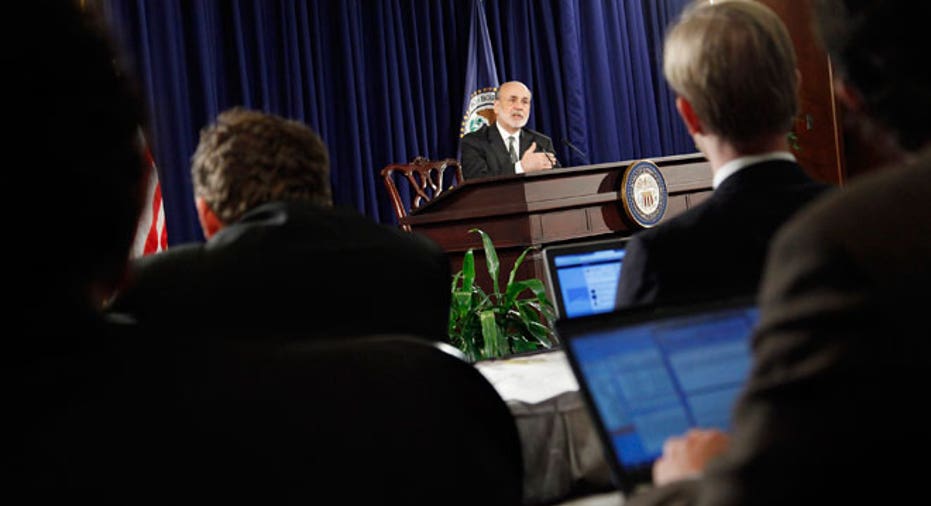Even QE3's Best-Case Scenario Won't Thrill You

In selling a third round of quantitative easing to the investing public and fellow central bankers, Ben Bernanke has been faced with an onslaught of doomsday predictions about rampant inflation and the destruction of the U.S. dollar.
But little has been made of what the Federal Reserve sees as the best-case scenario for the U.S. economy if those dark predictions don’t come true and Congress successfully avoids the looming fiscal cliff.
That’s because even economists who support the Fed’s latest emergency actions acknowledge QE3 by itself isn’t likely to trigger the robust recovery Americans have been hoping for.
“ It’s certainly possible we could get into that self-reinforcing cycle where the housing market picks up and job gains” build momentum, leading to stronger consumer spending, said Gus Faucher, senior macroeconomist at PNC Financial (NYSE:PNC). “It’s certainly possible. Is it likely? No.”
QE3 is Not a Magic Wand
Even the Fed’s own economic projections, released after Thursday’s QE3 announcement, don’t exactly paint a rosy picture for the years ahead.
The Fed now sees unemployment falling as low as 7.6% in 2013 and 6.7% in 2014, down from earlier projections for 8% and 7.7% respectively. Gross domestic product is expected by the Fed to rise as much as 3% in 2013 and 3.8% in 2014.
Considering 2014 would mark six years since the recession wreaked havoc on the economy, those figures still suggest a disappointing recovery.
“Monetary policy…is not a panacea. It's not by itself able to solve these problems,” Bernanke told reporters at his press conference on Thursday.
“These problems,” of course refer to the massive fiscal cliff that threatens to send the U.S. into a recession if not avoided as well as the lingering hangover from the worst financial crisis since the Great Depression.
Housing Boost?
Josh Feinman, global chief economist at Deutsche Bank’s (NYSE:DB) DB Advisors, said he supports the Fed’s actions but also realizes they’re not going to be a “game-changer for the economy or anything like that.” He said, “At best, it’s a modest help at the margin. The impact on the economy is probably small, but not zero.”
Faucher is a bit more optimistic, predicting a meaningful decrease in already-ridiculously-low mortgage rates that could significantly boost the housing market.
He said the rate of a 30-year fixed mortgage could fall 0.20 to 0.30 percentage points to around 3.25%, signaling a new record low. That, in turn, could drive sales of existing single-family homes to healthier levels and also boost new home construction, which remains off 75% from pre-recession levels.
“There’s a lot of pent-up demand for homes out there if people feel confident and the mortgage credit is there,” Faucher said.
Downsides Eyed
Concerned about potential negative side effects like inflation, skeptics of current Fed policy paint a much darker picture of the impacts of QE3.
“A best-case scenario is that it doesn’t do harm to the economy. I can’t really get much better than that,” said John Ryding, chief economist at RDQ Economics.
Michelle Girard, senior economist at RBS, echoed that sentiment. “I don’t think it’ll have much impact. I don’t even think the Fed thinks it will have much impact,” she said.
To be sure, the U.S. has so far avoided the debilitating spike in prices that inflation hawks have been predicting for years. However, new data released this week show jumping gas prices caused consumer prices in August to post their largest gain in more than three years.
Where the opponents and supporters of QE3 agree is the impact on risk assets, namely equity prices.
Inspired by the Fed’s aggressive stance, the Dow Jones Industrial Average surged 207 points on Thursday to its highest close since the Christmas of 2007, leaving the index up almost 11% so far this year.
“I believe QE is bullish for equities but that’s entirely different than the economy,” said Ryding.
'Tough Sell'
Of course, Faucher points out that the impact of higher stock prices shouldn’t be discounted, pointing to the so-called wealth effect.
“The stronger stock prices make consumers feel a little more confident,” he said.
Still, a rally for the blue chips isn’t going to by itself light a fire under the U.S. economy.
All of this underscores the difficulty Bernanke has had in persuading the public and fellow economists of the merits of his latest easy-money program.
“The Fed is trying to make a counterfactual argument: the economy would be much worse if we didn’t take these steps,” said Faucher. “I agree with that, but it’s tough to explain and it’s a tough sell.”



















